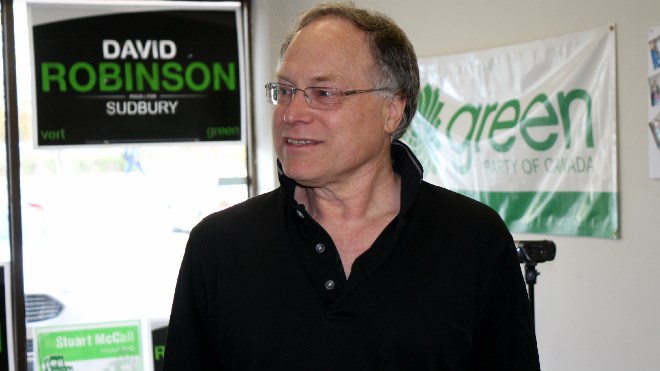There's too much we don't know about the Trans-Pacific Partnership trade deal, says Green Party candidate David Robinson, which means Canadians aren't in a position to judge whether it will cause us more harm than good.
Robinson, an economics professor at Laurentian University, said as a general principle, he supports the idea of freer trade.
“The Green Party is in favour of trade,” he said. “I'm an economist and I think there isn't any question that overall increasing freedom of trade how well off people are.
“What we don't know is what's in this deal. We really don't know whether there will be a statement that says all the public enterprises in the country have to compete and make a profit.”
The agreement, announced this week, aims to create a free-trade zone among 12 nations around the Pacific. The countries within its scope account for 40 per cent of the world’s economic output representing 800 million people generating $28.5 trillion in economic activity each year.
With Canada's economy so reliant on trade, Robinson said we had to be part of the negotiations. But he's concerned that the Conservative government didn't protect institutions they don't like. In particular, trade deals normally seek to put limits on subsidies provided to certain industries. He wonders whether something like the CBC or even public schools could face lawsuits because they receive money from the government.
“We know that Mr. Harper personally dislikes the CBC and the post office and probably the public school system,” he said. “That would be the end of the CBC as we know it. That might eventually be the public school system as we know it. Those are very serious little pieces. And the U.S. wanted that in.”
He compared it to the Catholic school system's successful campaign to receive the same government subsidies as the public school system in Ontario.
“If the TPP has that language in it, what's going to happen? Every private school will be able to make that claim.”
He compared it to importing a truck. You may need the truck for your business, but when it crosses the border, it may have unwanted cargo.
“It's what's being strapped underneath that you can't see,” he said. “You have no idea how much cocaine is strapped under the fenders … You know you have people sitting at the elbows of the negotiators saying put some weed into the gas tank so we can get it into these countries.
“We won’t know what was smuggled in until the document has been released and thousands of Canadians have gone through it with a fine-toothed comb.”
Read Robinson's extended take on the trade deal at his website.
Join Sudbury.com+
- Messages
- Post a Listing
- Your Listings
- Your Profile
- Your Subscriptions
- Your Likes
- Your Business
- Support Local News
- Payment History
Sudbury.com+ members
Already a +member?
Not a +member?
Sign up for a Sudbury.com+ account for instant access to upcoming contests, local offers, auctions and so much more.
